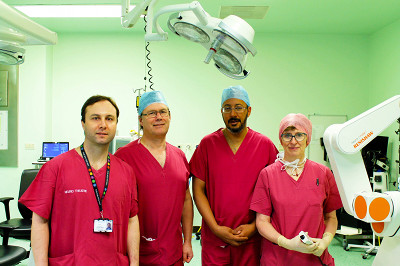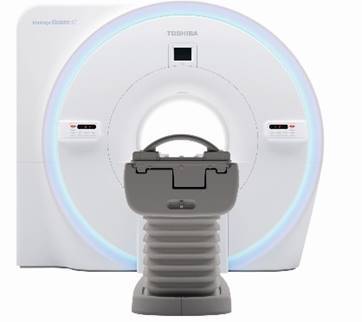| Medicine |
|
Abstract Title |
|
Abstract Number (type), Presentation Date, Time |
| OCREVUS (ocrelizumab) |
|
Brain MRI Activity and Atrophy Measures in Patients Receiving Continuous Ocrelizumab or Switching from Interferon Beta-1a to Ocrelizumab Therapy in the Open-label Extension Period of the Phase III Trials of Ocrelizumab in Patients with Relapsing Multiple Sclerosis |
|
S6.002 (platform), Sunday, April 22, 1:12 – 1:24 p.m. PDT |
| |
Annualized Relapse Rate and Confirmed Disability Progression in Patients Receiving Continuous Ocrelizumab or Switching from Interferon Beta-1a to Ocrelizumab Therapy in the Open-label Extension Period of the Phase III Trials of Ocrelizumab in Patients with Relapsing Multiple Sclerosis |
|
P1.366 (poster), Sunday, April 22, 11:30 a.m. – 5:30 p.m. PDT |
| |
Confirmed Disability Progression in Different Subgroups of Patients with Relapsing Multiple Sclerosis Who Received Ocrelizumab or Interferon Beta-1a in the Phase III OPERA I and OPERA II Studies |
|
P1.371 (poster), Sunday, April 22, 11:30 a.m. – 5:30 p.m. PDT |
| |
Establishment of Optimal Bioanalytical Parameters for Measuring Neurofilament Light Chain (Nf-L) in Multiple Sclerosis (MS) Subjects from Clinical Trial Cohorts |
|
P1.413 (poster), Sunday, April 22, 11:30 a.m. – 5:30 p.m. PDT |
| |
Impact of Ocrelizumab on Cognition in Patients at Increased Risk of Progressive Disease |
|
P1.420 (poster), Sunday, April 22, 11:30 a.m. – 5:30 p.m. PDT |
| |
Interim Analysis of the OBOE (Ocrelizumab Biomarker Outcome Evaluation) Study in Multiple Sclerosis (MS) |
|
S24.002 (platform), Tuesday, April 24, 3:42 – 3:54 p.m. PDT |
| |
Ocrelizumab May Reduce Tissue Damage in Chronic Active Lesions as Measured by Change in T1 Hypo-intensity of Slowly Evolving Lesions in Patients with Primary Progressive Multiple Sclerosis |
|
P3.376 (poster), Tuesday, April 24, 11:30 a.m. – 7:00 p.m. PDT |
| |
Safety of Ocrelizumab in Multiple Sclerosis: Updated Analysis in Patients with Relapsing and Primary Progressive Multiple Sclerosis |
|
S36.001 (platform), Wednesday, April 25, 3:30 – 3:42 p.m. PDT |
| |
Effect of Ocrelizumab on Vaccine Responses in Patients with Multiple Sclerosis |
|
S36.002 (platform), Wednesday, April 25, 3:42 – 3:54 p.m. PDT |
| |
FLOODLIGHT: Remote Self-monitoring is Accepted by Patients and Provides Meaningful, Continuous Sensor-based Outcomes Consistent with and Augmenting Conventional In-clinic Measures |
|
P4.382 (poster), Wednesday, April 25, 11:30 a.m. – 7:00 p.m. PDT |
| |
Design of the Ocrelizumab Pregnancy Registry to Assess Maternal, Fetal and Infant Outcomes in Women with Multiple Sclerosis Who Were Exposed to Ocrelizumab During, or Within 6 Months Before, Pregnancy |
|
P4.367 (poster), Wednesday, April 25, 11:30 a.m. – 7:00 p.m. PDT |
| |
Design of a Multi-source Post-marketing Study to Evaluate Pregnancy and Infant Outcomes in Women with Multiple Sclerosis Who Were Exposed to Ocrelizumab During, or Within 6 Months Before, Pregnancy
|
|
P4.372 (poster), Wednesday, April 25, 11:30 a.m. – 7:00 p.m. PDT |
| |
Time to Cognitive Worsening in Patients with Relapsing Multiple Sclerosis in Ocrelizumab Phase III Trials |
|
S44.005 (platform), Thursday, April 26, 4:18 – 4:30 p.m. PDT |
| |
Routine Laboratory Measures in the Controlled-treatment Period of Phase III Ocrelizumab Trials in Relapsing and Progressive Multiple Sclerosis |
|
P5.425 (poster), Thursday, April 26, 11:30 a.m. – 7:00 p.m. PDT |
| |
Baseline Characteristics of the CHORDS Study Population: A Phase III Trial to Evaluate the Effectiveness and Safety of Ocrelizumab in Patients with RRMS who had Disease Activity with Prior Disease-modifying Therapies |
|
P6.370 (poster), Friday, April 27, 11:30 a.m. – 5:30 p.m. PDT |
| |
Real-world Experience with Ocrelizumab
|
|
P6.356 (poster), Friday, April 27, 11:30 a.m. – 5:30 p.m. PDT |
| Crenezumab |
|
Characterization of the Selective In Vivo and In Vitro Binding Properties of Crenezumab: Insights into Crenezumab’s Unique Mechanism of Action |
|
P6.174 (poster), Friday, April 27, 11:30 a.m. – 5:30 p.m. PDT |
| |
Safety, Tolerability and Pharmacokinetics of Crenezumab in Mild-to-Moderate AD Patients Treated with Escalating Doses for up to 32.3 Months |
|
P6.182 (poster) Friday, April 27, 11:30 a.m. – 5:30 p.m. PDT |
| Gantenerumab |
|
Higher Dose Gantenerumab Leads to Significant Reduction in Amyloid Plaque Burden – Results for the Marguerite and Scarlet Road Open Label Extension Studies |
|
S2.005 (platform), Sunday, April 22, 1:48 – 2:00 p.m. PDT |
| |
Optimizing the Gantenerumab Phase 3 Dosing Regimen Through PK/PD Modeling and Clinical Trial Simulations |
|
P6.179 (poster), Friday, April 27, 11:30 a.m. – 5:30 p.m. PDT |
| RG7916 |
|
RG7916 Significantly Increases SMN Protein in SMA Type 1 Babies |
|
004 (Emerging Science platform), Tuesday, April 24, 5:54 p.m. PDT |
| |
Updated Pharmacodynamic and Safety Data from SUNFISH Part 1, a Study Evaluating the Oral SMN2 Splicing Modifier RG7916 in Patients with Type 2 or 3 Spinal Muscular Atrophy
|
|
P4.453 (poster), Wednesday, April 25, 11:30 a.m. – 7:00 p.m. PDT |
| |
Preliminary Evidence for Pharmacodynamics Effects of RG7916 in JEWELFISH, a Study in Patients with Spinal Muscular Atrophy Who Previously Participated in a Study with Another SMN2-Splicing Targeting Therapy |
|
S46.003 (platform), Thursday, April 26, 3:54 – 4:06 p.m. PDT |
| |
Relationship Between Central and Peripheral SMN Protein Increase Upon Treatment with RO7034067 (RG7916) |
|
S46.007 (platform), Thursday, April 26, 4:42 – 4:54 p.m. PDT |
| Olesoxime |
|
A Long-term, Open-label Follow-up Study of Olesoxime in Patients with Type 2 or Non-ambulatory Type 3 Spinal Muscular Atrophy Who Participated in a Placebo-controlled Phase 2 Trial
|
|
S46.002 (platform), Thursday, April 26, 3:42– 3:54 p.m. PDT |
| RG6042
(IONIS-HTTRx)
|
|
Effects of IONIS-HTTRx in Patients with Early Huntington’s Disease, Results of the First HTT-lowering Drug Trial |
|
CT.002 (plenary session), Tuesday, April 24, 9:15 – 9:27 a.m. PDT |
| RG6206 |
|
A Randomized, Placebo-controlled, Double-blind, Phase 1b/2 Study of the Novel Anti-myostatin Adnectin RG6206 (BMS-986089) in Ambulatory Boys with Duchenne Muscular Dystrophy
|
|
P5.431 (poster), Thursday, April 26, 11:30 a.m. to 7:00 p.m. PDT
|






